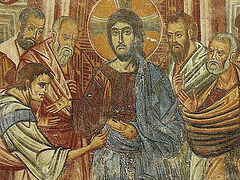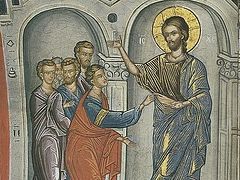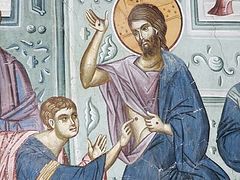Dear brothers and sisters! Peace be with you, Christ is Risen!
We all know that the earth is full of rumors. A person saw or heard something somewhere and told it to someone else, and so down the chain, and information begins to spread among people. There is even such a thing as “Chinese telephone”, when in transmitting information, people omit or distort the main facts, which could have conveyed this information more accurately and correctly. How does all this relate to our faith? We all consider ourselves to be believers, but how was the faith of each one of us born—from hearing or seeing? Was it a personal search for God, painful and difficult, or were our ideas about God formed through the transfer of knowledge about Him from the older generation? After all, adults never lie, and their words are always perceived as an indisputable truth. It is worth noting that people who convert at a mature age treat everything sacred with special reverence and profound respect, while people who were brought up in the church from childhood, as if from habit, begin to lose the most precious thing that was instilled in them. Today we often hear heartbreaking stories of desperate parents who cannot understand why their children, who were brought up in love for the Church from a very young age, when they grow up do not want to talk about God at all, take off their crosses, stop attending church, etc. Of course this is a terrible tragedy, but the parents themselves are often to blame for it. After all, introducing their children to the Church structure, they failed to acquaint them with God. Behind the sacraments and the rites their children did not see the Great and Bright Person of Christ, Who fills the whole Church, all the Sacraments, and all the rites. Such tragedies, caused by walking away from God, arise because a personal meeting with the Living Christ did not take place. Christ is the true Foundation of our faith.
But how can you come to believe in someone you have never seen? The Apostle Paul says that faith cometh by hearing (Rom. 10:17); and, indeed, many people kindle the flame of faith in their souls from other bearers of the same faith whether by seeing the pious lives of believers and following their good examples, adopting knowledge of faith in conversation with their relatives or acquaintances, and trusting their feelings and religious experience. But someone else’s knowledge and ideas cannot always reflect the whole essence of ideas about God correctly and accurately. Moreover, when we talk about Heavenly things, it is very hard to build our narrative in an acceptable verbal form, and it turns out that we give birth to numerous fables and superstitions in the immature minds of our listeners, in which they begin to believe, replacing the true and real God with false facts about God, invented by others on the fringes of the Church. Over time, in our personal search for God, we get disappointed that these poor excuses for teachers and preachers presented all this to us in such a distorted and corrupted form. That is why after talking with people we are often surprised that everyone seems to have their own faith and their own idea of God, and all these ideas are not based on the Gospel, but on someone else’s stories. So we can see pluralism in matters of faith. For some, faith is associated with miracles—and if there are no miracles, then there is no faith. For others, it is based on the letter of the law—the strict implementation of all the canons and rules. For others, faith manifests itself in exceptional asceticism. For others it is expressed in free interpretations, from which all kinds of distortions and even heresies result. The Church of Christ, carefully guarding the spiritual peace of each of its members, has created a system of rules, canons and dogmas in order to present a complete and undamaged picture of the doctrinal truths about God.
Without personal, living communion with Christ, our faith is based solely on other people’s knowledge. In effect, we do not experience our own spiritual life but cling to the experience of other people who testify that they have seen God and communicate with Him. Today we commemorate an event that is connected with the experience of the personal and living faith of the Apostle Thomas. There is a jocular, scornful expression: “Doubting Thomas”. It is fundamentally unfair. The Apostle Thomas was neither an atheist nor a skeptic. He was a man who devotedly loved his Teacher and always remembered His words that after Christ there would be false teachers and false prophets who would pose as Christ. That is why he was slow to believe rumors and tales, even from his closest and most devoted friends. Thomas himself wanted to make sure to see the Risen Christ. He did not want to build ideas about the Risen Savior on the basis of the other apostles’ testimonies. He himself wanted to be “initiated” into the mystery of the Resurrection of his Teacher. That’s what living faith is—an incessant personal search. It is not the fear of asking yourself questions or even doubting something-—it is an unceasing movement towards God. The “unbelief” of the Apostle Thomas is not a denial or rejection—it is a voluntary departure from the original faith, born from hearing—which the Apostle Paul mentioned—to a contemplative faith, which alone is capable of fully uniting a person with Christ in a living experience of communion with Him.
How instructive in this regard the Apostle Thomas’ example is! After all, he teaches us not only to base our faith on a personal search, but also to be self-possessed in everyday and practical matters, to double-check information without rushing to share it with others, to comprehend everything, think it over, and only then make decisions.
And when the Apostle Thomas exclaimed with great faith: My Lord and my God! (Jn. 20:28), he did it from personal feeling, from the inner joy of his personal and living communion with God, from the meeting with Christ he had experienced. On these holy Paschal days, I would like to wish that all your souls meet God, that your lives with God are not built on coercion, but on a constant search and new feelings from a live meeting with Him. And then, together with the Apostle Thomas, we can exclaim: My Lord and my God! Christ is Risen!







